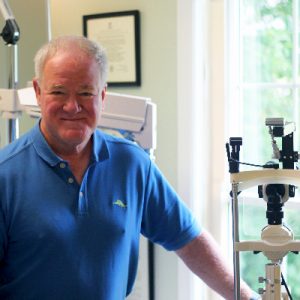Approximately 15% of all pregnant women experience visual fluctuations during their pregnancy.
Here are the top 5 FAQs when it comes to pregnancy and eye health:
1. Can pregnancy affect my vision?
Yes! Pregnancy’s hormonal and physical changes can have an impact on your vision.
The majority of problems are small and only last a short time. After your baby is born, your vision will likely return to normal. However, some pregnancy-related issues may necessitate medical treatment.
2. Should I tell my provider if I’m having vision changes?
Yes, during pregnancy always discuss any changes to your vision with your medical professionals.
If you have any of the following symptoms, seek medical attention:
- Blind spots
- Blurry vision
- Double vision
- Light sensitivity
- Temporary loss of vision
- Flashes or spots of light in your vision
SEE RELATED: Vision Changes in Pregnancy
Contact an eye doctor near you, who can help determine if you have a more serious condition.
3. How can pregnancy affect my eyes?
Dryness and irritation
During pregnancy, and for as long as you’re breastfeeding, your eyes may become drier and more itchy.
This, combined with small changes in the shape and thickness of the cornea, can make wearing contact lenses uncomfortable.
Visual disturbances from migraines
During pregnancy it is possible that you’ll observe flashing lights or blind spots.
A condition known as migraine headache with aura, which some women encounter for the first time during pregnancy, is one possible cause.
An aura precedes a painful headache (typically on one side of the head) with this syndrome. Visual disturbances such as intense flashes of light, zigzag lines, blind spots, or even temporary vision loss are examples of this. Aura symptoms can also occur without causing a headache.
Eye disease
Central serous chorioretinopathy is an eye disease that affects some pregnant women who are otherwise healthy.
Fluid collects beneath the retina, causing the retinal layers to separate and distort vision, resulting in blind spots.
This condition is linked to stress hormones and usually manifests in the third trimester, or right after birth, though it can occur in the first or second trimester.
Toward the end of your pregnancy or a few months following birth, your vision should return to normal.
Gestational diabetes
Pregnancy might potentially improve or exacerbate existing eye conditions.
If you have type 1 or type 2 diabetes, for example, your condition may worsen during pregnancy.
See your eye doctor before you are pregnant and again during the first trimester to be tested for damage to your retina’s blood vessels. During pregnancy and the postpartum period, you’ll need to undergo more frequent eye exams.
Glaucoma, on the other hand, might improve during pregnancy, so your eye doctor might be able to lessen your medication dose – and thus your baby’s exposure to it.
4. Can I get relief for dry eyes during pregnancy?
Yes! Your eye doctor will be able to tell you about safe dry eye treatments.
Some over-the-counter remedies are safe to take during pregnancy, but others include active components that may not be safe.
If you wear contacts, make an effort to wear them for shorter periods of time to avoid dryness and irritation. If that doesn’t work, consider switching to glasses until your baby arrives.
Take frequent breaks from the TV, computer, and smartphone. on a regular basis. Dryness and discomfort can be exacerbated by staring at a screen for lengthy periods of time and not blinking as frequently as necessary.
5. Is there ever a reason to be concerned with vision changes during pregnancy?
Yes, some vision changes can indicate potentially serious conditions like preeclampsia, high blood pressure or diabetes.
Visual symptoms affect about up to 50% of all women with eclampsia, and may tend to worsen as this serious condition progresses.
LEARN MORE: Guide to Eye Health
If you’re experiencing any vision changes during pregnancy, contact an eye doctor near you.
During pregnancy, seek medical attention if you experience: blurred vision, inability to focus, blind spots, double vision, and flashes of light.









